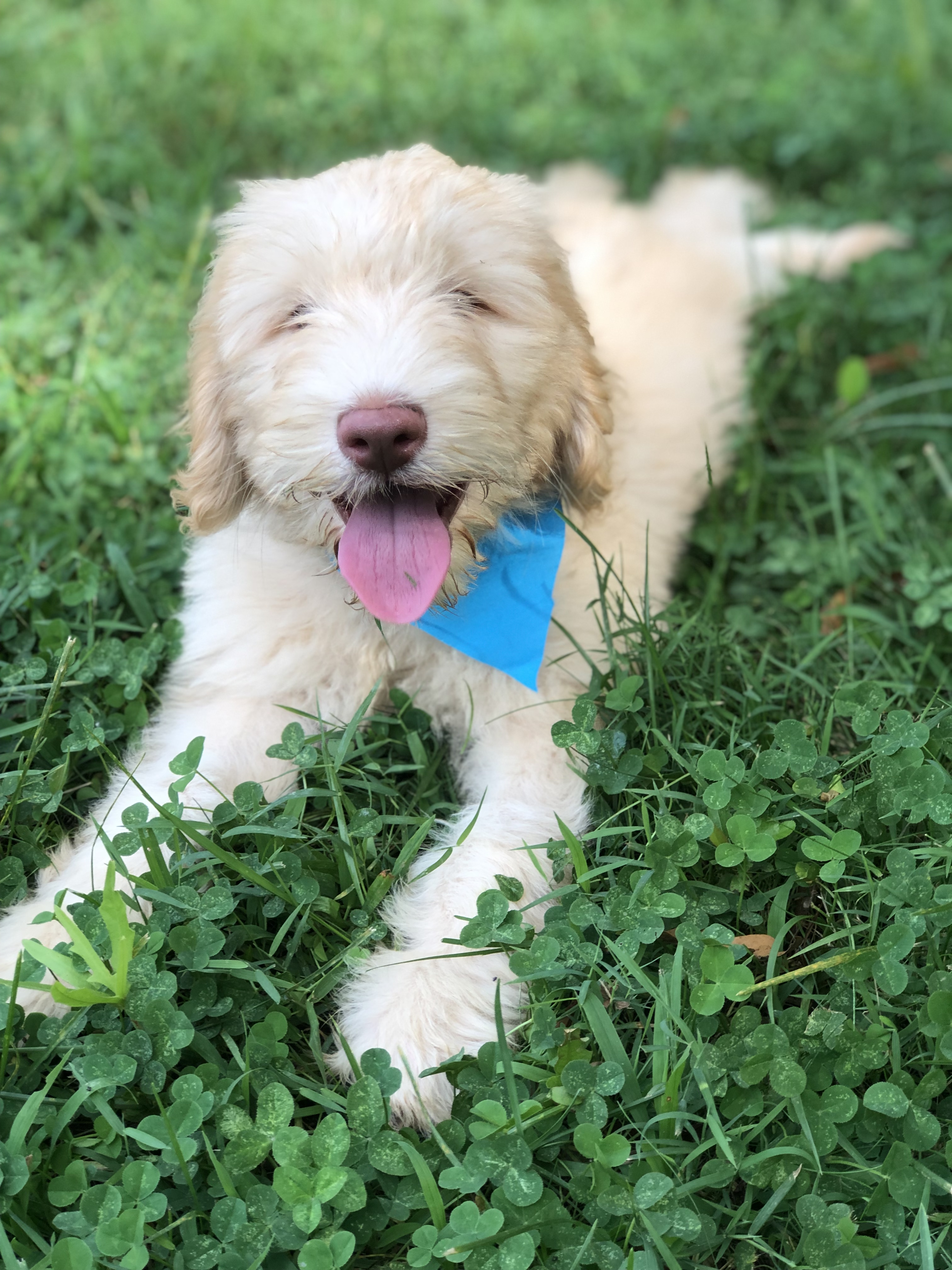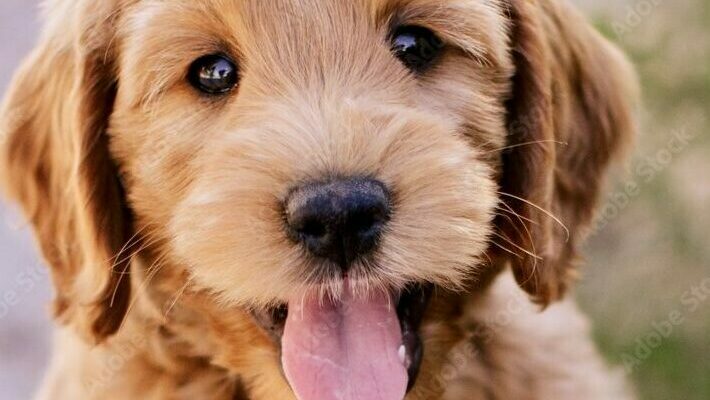Potty Training: Teach your puppy to go outside
House and potty training is often the scariest part of getting a new puppy. After all, nobody likes chasing after a puppy and cleaning up constant messes. However, the process doesn’t have to be stressful or hard. Don’t let potty training your new puppy intimidate you. All you need is the commitment, patience and a lot of consistency. If you take the time to introduce good puppy house training habits from the beginning, it’ll be much easier in the long run – not just for you, but for your puppy as well.
The length of time this process takes varies from dog to dog. Don’t expect (or demand) fast puppy house training results. It’s actually easier to train a new puppy than to change the learned behaviors of an older dog. It takes time to teach your puppy the basic house rules. When you buy your puppy from Homestead Designer Doodles, we have actually started this process for you! When your puppy comes to you, he/she is not fully potty trained yet, but their training has begun by us and by their mother! When the puppies go to their forever homes at between 8-10 weeks old, they are still too young to be reliably house trained, so when you get your puppy, you will still have some work ahead of you. But, hopefully all of our effort with the pups will pay off when they transition to your home with continued training and perseverance.
WHEN TO START HOUSE TRAINING
We recommend that from 8-12 weeks to be focused on crate training your puppy, which really goes hand in hand with potty training your puppy! See more at our Crate Training tips under resources.
House training often starts when the puppy is between 12-16 weeks old. That is when your puppy should have enough control of his/her bladder to control where it is relieved and is understanding the cues from your household.
ESTABLISH A ROUTINE FOR YOUR PUP
It is part of a dogs’ natural programming to never poop/pee in their den. Part of the puppies’ desire for a clean den area comes from imitating their mother. Your job is to simply recreate what the mother dog does by creating set timings for feedings, bathroom breaks, playing and sleeping. Conveniently, right after those times are the most common for a puppy to need to go potty. It truly is about having a routine that they begin to predict and know.
Another perk is that your puppy’s digestive system is pretty predictable. If you know that your puppy will need to go out between 5-20 minutes after eating, you can keep your eyes on the clock to maintain a regular schedule. We recommend keeping the puppy on a regular feeding schedule and take away the food in between meals.
The most common signs that your puppy needs to use the potty are: whining, scratching, circling, sniffling, barking or smelling and looking around. If they have had an accident in the house, they are likely to return to that place again…so be on the lookout! If you see any of these behaviors, take your puppy out right away. Its always better to be safe then sorry.
The size/age will be a big determinate of how often your puppy will need to go. Smaller dogs have smaller bladders and higher metabolisms and will require more frequent trips outside; while larger dogs are able to hold it. It seems that in general male puppies can hold themselves a tad longer than their female counterparts.
POTTY TRAINING SUGGESTIONS:
A general rule of thumb is that most medium breed dogs (such as a doodle) can hold it half the number of hours of weeks old they are. So a 4 week old pup is going potty every 2 hours; an 8 week old pup is going potty every 4 hours; and a 12 week pup is going potty every 6 hours.
Bring your puppy to the same spot each time to take care of their business. Part of this is to be consistent and teach your puppy a habit. More practically, the puppy’s scent will act as a trigger. How cool is that!
When your little dood finishes his/her business; praise them and even from time to time give them a treat!
Your attitude is a big influencer. If you’re feeling impatient or nervous, your dog will feel it as well. So fake your patience if need be.
Your dog picks up on your tone and energy. Don’t talk in a high voice. It’s only distracting your puppy from the task at hand.
Provide regular exercise. Seriously, wear your puppy out during play times! They got plenty of activity before they left for your home with their siblings and their momma…so continue to give them plenty of puppy play time. Exercise also helps with motility.
If you have a particular spot where you want your puppy to go potty (perhaps in the bushes away from where kids play), you can place a puppy pee pad in that location, or spray ammonia in that spot. The particular scent should help your pup learn to eliminate in that spot.
BEST TIMES TO TAKE YOUR PUPPY OUTSIDE
First thing in morning
After meals
Before you leave
After playing
When you get home
After spending time in the crate
After nap time
Anytime you’ll be leaving your puppy alone
Before bedtime
SCHEDULE EXAMPLE
Wake up
Taken to potty outside
Eat/Drink
Taken to potty outside
Playtime
Taken to potty outside
Nap time
Repeat
As you can see, if you don’t remain consistent, your puppy will learn a bad habit that anywhere in the house is fine to go. You can’t get upset at your dog if you’re not doing your part and bring him/her outside. After all, when you gotta go you gotta go!
USING A CRATE TO HOUSE TRAIN
This is not a long-term solution or meant to be permanent for your little dood. However, it would be impossible to watch your puppy at all times. Crates can be effective to train your puppy to hold it until taken outside, you’ll also learn cues that your puppy needs to go. See more about crate training on our resource page.
WHAT TO DO WHEN THE PUPPY HAS AN ACCIDENT
First of all, accidents are bound to happen when your puppy is still learning how to hold it. Do not punish your puppy or cause any negative associations with its bodily functions.
If you find a spot but didn’t see it happen, don’t get angry. But bring them back to the spot and say “no” firmly so they understand it is wrong and then take them outside to let them know where it should be done.
Don’t hold your puppy’s nose in it, scold them, or give any other punishment. This will only make them afraid of you. Puppies cannot connect your anger to their accident.
If you do catch them in the act, clap loudly to grab their attention and quickly remove the puppy to the correct location. After they finish their business in the appropriate spot then praise, praise, and praise them! Associate the right place with positivity and praise.
With all that being said, we do suggest you stock up on some cleaning supplies for when those accidents do happen.
Just like a baby becoming a child and becoming potty trained, your little puppy will get it too! If you put in a little additional work at the beginning and remain consistent through the whole process, your puppy will learn in no time. Remember, this is a very natural process. Enjoy this time with your new little dood!





No comments yet. You should be kind and add one!
The comments are closed.